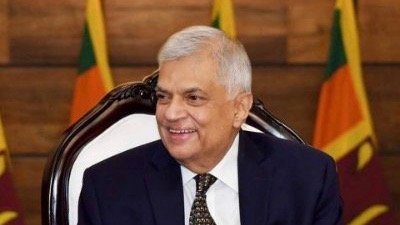On Monday, January 2, Sri Lanka’s government announced that it will be freezing all government-sector recruitments. This latest announcement comes following a series of other International Monetary Fund (IMF)-mandated austerity measures announced by the Ranil Wickremesinghe government.
According to Economy Next, at least 30,000 public-sector employees were forced into retirement in 2022 after President Wickremesinghe reduced the retirement age of state employees from 65 to 60. The government has announced that it will not fill these vacancies. Instead, it will freeze all government recruitment in a bid to cut down government spending, in order to obtain a USD 2.9 billion loan from the IMF.
In September, Sri Lanka reached an IMF staff-level agreement for the USD 2.9 billion bailout. Its approval is currently pending, “contingent on the implementation by the (Sri Lankan) authorities of prior actions.”
On December 8, the parliament passed the third reading of the ‘Budget 2023’ bill, termed the most devastating piece of economic legislation since the 1977 liberalization by economic experts and trade unionists, who rejected it and observed a national day of protest on the same day.
The new budget is set to relax labor laws, increase taxation, cut down on state expenditure and subsidies, and privatize state assets. Presenting the document to the House, Wickremesinghe defined the new economy as “a social market economy or open economic system of social protection.”
Electricity tariff hike
In recent weeks, the Sri Lankan government has introduced a series of policy reforms attacking the working class’ purchasing power in the name of fiscal tightening and reducing public expenditure amid a severe economic crisis.
On January 2, the Finance Ministry ordered the state spending unit to prioritize essential services to restrict spending. “Public expenditure in the year 2023 should be incurred more prudently than ever before, due to the current economic crisis,” a Treasury circular to ministries, department, and state corporations said, reported Economy Next.
The government has also announced plans to hike power tariffs by 60-65% in January 2023. This will be the second tariff hike after August 2022.
Announcing the tariff hike on December 27, Minister of Power and Energy Kanchana Wijesekera said, “if not (hike the tariff) we will have to have more power cuts. The people asked for uninterrupted power. To do that we need to operate both CEB [Ceylon Electricity Board] and private power plants.”
Workers and officials in electricity and related sectors have raised concerns about the government decision to raise electricity prices. Chairman of the Public Utilities Commission (PUCSL), Janaka Ratnayake, termed the cabinet approval of the electricity tariff hike “unfair” and “against the taxation process.” Of the total five million consumers of electricity, he said, 1.7 million in Sri Lanka consume less than 30 units of electricity per month. “With the implementation of the proposed hike, the tariff is set to increase by 1200% for this group as well as the group which consumes 60 to 90 units a month,” reported Daily Mirror.
Increasing taxation
Sri Lanka has also introduced a revised tax regime effective from January 1, 2023. Its provisions include increasing personal income tax, a reduction of personal relief entitlement by half, and a revision of tax slabs, among others. In response, the Government Medical Officers Association (GMOA) has announced a “black protest week” starting January 23 if the government makes no move to amend the proposed tax laws after hearing people’s grievances.
.@RW_UNP trying to isolate those who get Rs. 100K+ (USD 273) salary from the rest of the working class to justify the income tax hike📈. We demand GOSL to stop putting the burden of the economic crisis on the working class & ask capitalists to pay their fair share.#lka #SriLanka
— United Socialist Party (@USPSriLanka) October 15, 2022
Peoples Dispatch earlier spoke to economist Dhanusha Gihan Pathirana about the tax reforms introduced by the government in the latest budget and the impact they are likely to have on the ongoing cost of living crisis in the country. Pathirana pointed out that “The indirect tax component reflected by goods and services taxes is projected to rise as much as 80% next year, as opposed to the 60% increase in direct taxes, reducing the direct-to-indirect tax ratio of the economy to around 29% from 30.3% in 2022. This means that the problem of hyper-inflation will be further aggravated once the proposals come into effect. A falling direct-to-indirect tax ratio indicates that a greater share of the fiscal burden is being paid by ordinary consumers, causing internal price levels of essentials to rise further.”
“Despite an ongoing crisis of accessing basic human rights, the government of Sri Lanka is busy colluding with the business elite, finding new ways to open more sectors of the economy to private profiteering, and slashing workers rights,” he added.
Crisis-hit country
Sri Lanka saw its worst economic crisis since independence in 2022, as the country completely ran out of fuel and food. The economy saw an acute forex shortage, less to no liquidity, and hyperinflation through the year. The nation’s currency fell over 60% in 2022 after the central bank printed billions of Sri Lankan rupees to finance government revenue, which resulted in inflation soaring to a record 73% in September—forcing millions of people to skip meals to make ends meet.





